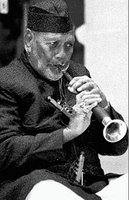 I admire people who can make you laugh with their writing. It requires a special skill and the ingenuity to view the world in a skewed manner. Writers who trigger a tickle in the funny bone time and again are, in my view, geniuses. And no, I don't use that term lightly. The writer we meet today is a master of those funny missiles. He is the versatile, uproarious, and nonsensical Sukumar Ray—Bengali literature's very own Lewis Carroll.
I admire people who can make you laugh with their writing. It requires a special skill and the ingenuity to view the world in a skewed manner. Writers who trigger a tickle in the funny bone time and again are, in my view, geniuses. And no, I don't use that term lightly. The writer we meet today is a master of those funny missiles. He is the versatile, uproarious, and nonsensical Sukumar Ray—Bengali literature's very own Lewis Carroll. For, who would not delight to learn about the activities of the royal folks and subjects of Bombagarh, a fictitious kingdom, where the king keeps dried mango candy framed on his walls, the queen roams around with a pillow tied to her head, the citizenry does cartwheels on catching a cold, the king's aunt plays cricket with pumpkins, and the minister beats an urn while sitting on the king's lap?
For, who would not delight to learn about the activities of the royal folks and subjects of Bombagarh, a fictitious kingdom, where the king keeps dried mango candy framed on his walls, the queen roams around with a pillow tied to her head, the citizenry does cartwheels on catching a cold, the king's aunt plays cricket with pumpkins, and the minister beats an urn while sitting on the king's lap? Ha Ja Ba Ra La or Mumbo Jumbo is a novelette peopled by strange creatures who are governed by even more outlandish rules. This complete nonsensical story is often compared to Alice's Adventures in Wonderland in style and presentation. Yet, Ha Ja Ba Ra La, which is actually a random ordering of six Bengali consonants, remains peculiarly Bengali in its idiom and rendition.
Ha Ja Ba Ra La or Mumbo Jumbo is a novelette peopled by strange creatures who are governed by even more outlandish rules. This complete nonsensical story is often compared to Alice's Adventures in Wonderland in style and presentation. Yet, Ha Ja Ba Ra La, which is actually a random ordering of six Bengali consonants, remains peculiarly Bengali in its idiom and rendition.While in your childhood, Sukumar Ray and his creations entertain you as dear friends, as an adult, you begin noticing the subtle satirical undertones in his works. He takes a dig at corrupt politicians in Ha Ja Ba Ra La, pokes fun at non-laughing pseudo intellectuals in the poem Ramgarurer Chhana (Ramgarur's Offspring), and even some of the images in Bombagarher Raja insinuate the lack of activity that leads members of the royalty to find inane vocations to busy themselves with.
Over the course of the next few posts, I will introduce you to Dashu, a character created by Sukumar Ray. Be alarmed; Dashu is a bundle of surprises, accidents, and craziness. If you don't like laughing, you may not be interested in knowing about him. But otherwise...stay tuned!
Note: Illustrations by Sukumar Ray
awchain, Sukumar Ray, Nonsense Literature, Humor, Children's Literature, Bengali Literature









